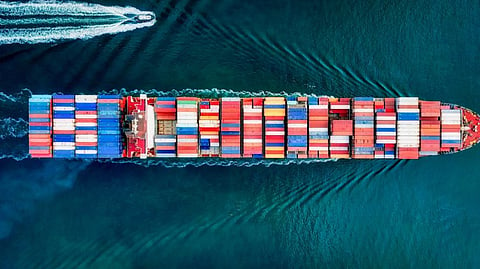White Paper: Simple Steps to Decarbonize Deep-Sea Shipping
Swiss based marine engine technology developer WinGD has published a new white paper outlining the steps it believes will enable the decarbonization of deep-sea shipping in line with the IMO’s provisions.
The guide aims to provide shipowners with an illustration of the choices that can be made with confidence today to drastically reduce emissions, rather than waiting for the emergence of ‘silver bullet’ technologies.
The paper, ‘Navigate the Future with Confidence’, advocates a step-by-step, holistic approach towards improving energy efficiency.
The use of LNG is one of the single biggest ways to reduce emissions in current vessels, and will enable the use of carbon-neutral synthetic or bio-gas when it becomes available. Taking action now is the right choice as simply waiting for the availability of clean fuels will not be enough.
Combination of solutions for faster progress towards decarbonization
In addition to looking for an ideal alternate fuel for decarbonizing the industry, other advanced technologies also need to be developed and installed in ships in order to help the industry achieve the IMO’s 2050 targets.
Eng. Ibrahim Behairy, Managing Director, Middle East and Africa, WINGD, said: “We at WinGD have always been at the forefront of decarbonizing the industry and achieving the targets set by the IMO as soon as possible.
"We are aware of the fact that alternate fuels or modern technology alone cannot achieve the set targets by 2050, therefore a combination of both will be necessary to accelerate our progress towards net-zero emissions.
DHL Purchases 33 Million Litres of Sustainable Aviation Fuel
"In line with this, WinGD has introduced various solutions such as the dual-fuel X-DF engine platform and the X-DF2.0 technologies, which are capable of reducing methane slip by 50%, and also of reducing greenhouse gas emissions by a further 10%.
“Moreover, with the help of our newly launched Global Test Centre, we will now be able to give our efforts a better direction and be able to accelerate our journey towards decarbonization.
"At the testing centre, we will be able to carry out more research and innovation around our future fuel population solutions, holistic energy management systems, and power generation based on new energy converters, and therefore provide more efficient solutions for the industry.
"The testing centre will also facilitate the development of new technologies and products with the help of its two 2-stroke engines, in addition to its test rigs set up for the validation of sub-systems such as fuel injection, pumps, and gas admission valves.”
Usage of advanced technology for net-zero emissions
Further elaborating on the need to use hybrid propulsion systems and advanced technology to accelerate the progress of the sector towards net-zero emissions, Dominik Schneiter, Vice President of Research & Development, WinGD, said: “The low-speed marine engine will remain the core power provider for deep-sea shipping.
"The heart of clean propulsion is already in place and the task now is to incorporate the technologies that will help reach zero emissions: carbon-neutral fuels, electrical hybrid power sources, efficiency enhancing digital technologies, and optimized ship design.”
The white paper highlights the engine developments that enable the use of clean fuels such as ammonia and methanol by 2025. WinGD’s development work on electrical hybrid systems is also summarized in the paper.
The company has developed a comprehensive simulation platform to study hybridization options for all applications and operation patterns.
Combinations of two-stroke engines and batteries, linked via power take off/take in systems, are considered in the white paper with an aim of reducing installed power, fuel consumption, and emissions, thus leading to better EEDI/ EEXI ratings, and also, better CII ratings.
Dominik Schneiter said: “By preparing for these future scenarios, WinGD is taking out risks associated with engine investments for shipowners and operators. In uncertain times, our extensive research aims to place the future performance and compliance of WinGD engines beyond doubt.”
The paper can be downloaded here.
Read More: Supply Chains Today Moving Towards More Sustainable Logistics


